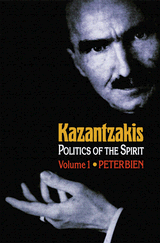#1
Kazantzakis: Politics of the Spirit, por Peter Bien
"Beginning with Kazantzakis's early career in fin-de-siècle Paris and his discovery of William James, Nietzsche, and Bergson, the book continues by describing his experiments with communism in turbulent Greece, his visits to Soviet Russia, and the publication of his epic Odyssey in 1938. Bien demonstrates that politics and religion cannot be separated in Kazantzakis's development. His major concern was personal salvation, but the method he employed to win that salvation was political engagement. Did deliverance lie in nationalism? Communism? Fascism? He eventually rejected each of these possible solutions as morally appalling. Abused by both left and right, he insisted on an "eschatological politics" of spiritual fulfillment." - do comentário da Amazon
Este deve ser mesmo muito bom. Mas vem lá das Novas Zelândias ou da Austrália ou de coisa parecida, portanto parece-me que ainda vai demorar um bocado até o começar a ler. Um facto curioso, a minha cópia (usada) da Odysseia deste senhor também veio da Nova Zelândia. O que é que aquelas pessoas têm pelo Kazantzakis? Quem dera que tivéssemos também nós. Mandei-o vir por um site que descobri há pouco tempo, Better World Books, que, vejam vocês mesmos, não parece mau de todo.
#2
Nihilism: A Philosophical Essay, por Stanley Rosen
"Nietzsche defines nihilism as the situation which obtains when "everything is permitted." If everything is permitted, then it makes no difference what we do, and so nothing is worth anything. We can, of course, attribute value by an act of arbitrary resolution, but such an act proceeds ex nihilo or defines its significance by a spontaneous assertion which can be negated with equal justification. More specifically, there is in such a case no justification for choosing either the value originally posited or its negation, and the speech of "justification" is indistinguishable from silence. For those who are not gods, recourse to a creation ex nihilo, whether disguised by the intricacies of the axiomatic method or onto-poetic integrity, reduces reason to nonsense by equating the sense of significance of speech with silence." do Prefácio
Um dos meus comentadores-filósofos favoritos, se não mesmo o favorito, contra o meu filósofo favorito. Sim, estou-me a testar. Isto vai ter a sua piada. Por favor liguem daqui a duas semanas para se certificarem que ainda estou vivo.


Sem comentários:
Enviar um comentário